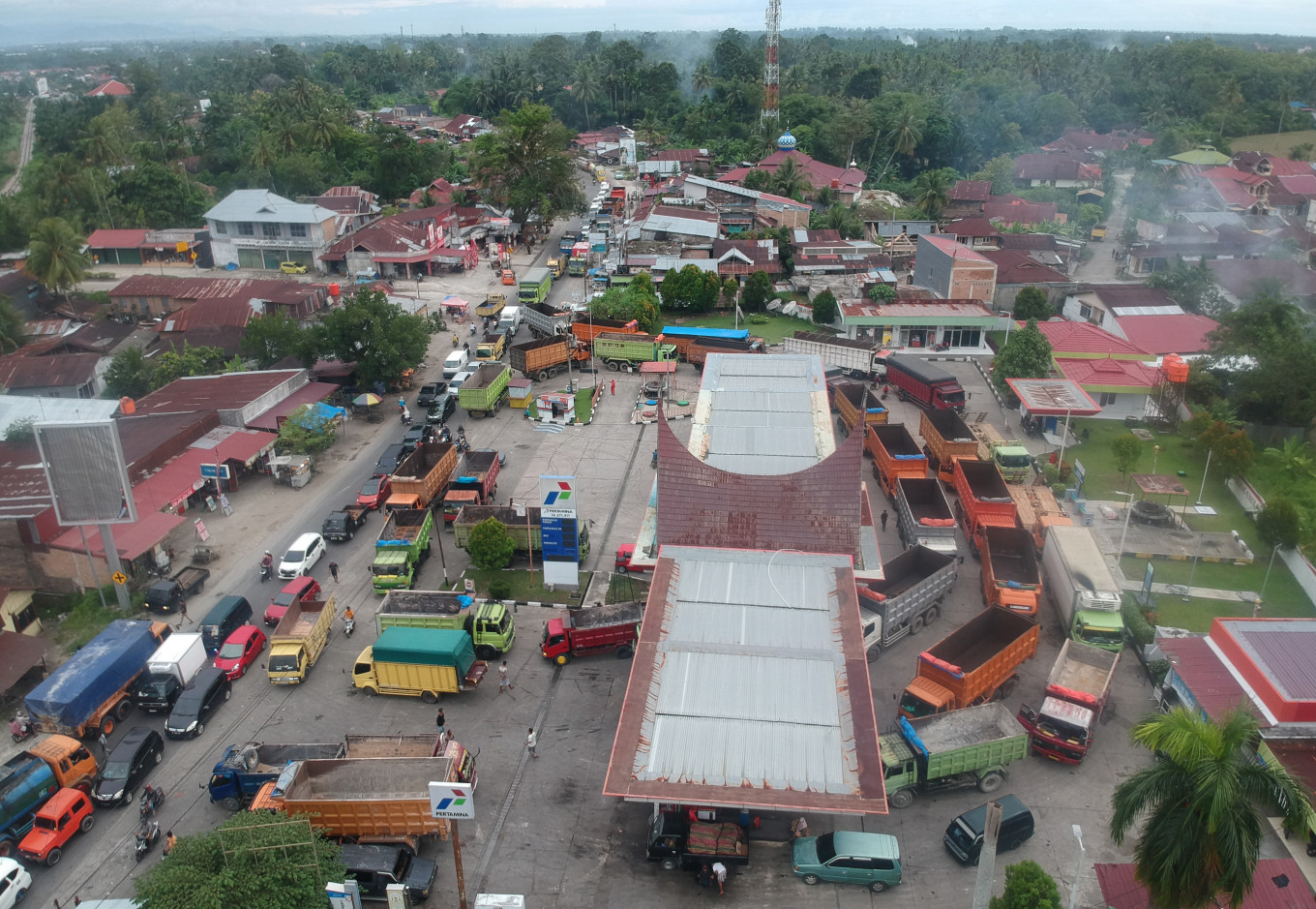Popular Reads
Top Results
Can't find what you're looking for?
View all search resultsPopular Reads
Top Results
Can't find what you're looking for?
View all search resultsSubsidized diesel shortage hits freight haulage industry
Truckers have been waiting for up to 24 hours to refill at fueling stations, causing disruptions in domestic supply chains.
Change text size
Gift Premium Articles
to Anyone
A
subsidized diesel shortage has disrupted trucking operations in many parts of Indonesia, as recovering domestic fuel demand meets rising global oil prices.
Local news outlets have reported long lines of trucks at fueling stations operated by state-owned oil giant Pertamina across the archipelago, with drivers saying they have had to wait for up to 24 hours for the diesel fuel commonly known as “solar”. Trucking associations say the problem is particularly acute in Sumatra, Kalimantan and Sulawesi.
The Indonesian Truck Operators Association (Aptrindo) said on Tuesday that the supply crunch meant drivers either waited longer to refuel or got less fuel than needed, forcing them to refuel more often than usual, causing delays.
Aptrindo deputy chairman Kyatmaja Lookman said that this month was critical for delivering goods ahead of the expected Ramadan and Idul Fitri consumption spike. The fasting month begins this year in April.
“It is almost Lebaran, and in less than a month trucks will be limited due to mudik [exodus]. If the government added to the [subsidized diesel] quota, there would be no queue,” said Aptrindo deputy chairman Kyatmaja Lookman on Tuesday.
Trucks, which are the main users of the nation’s subsidized diesel, form the backbone of the domestic freight industry. Road transportation accounts for 70 to 80 percent of the freight volume moved in the country, according to Mordor Intelligence data cited by the Organization of Economic Cooperation and Development (OECD).
Regulations state that subsidized diesel may be used in buses, trains, certain ships and private and commercial trucks, except those with more than six wheels carrying mining or palm oil goods.
Indonesian Logistics Association (ALI) chairman Mahendra Rianto said on Thursday that the fuel crunch had disrupted domestic supply chains as goods were taking longer to reach local distributors.
“In economic law, if the supply chain is disrupted, there will be scarcity, which could lead to a surge in prices,” said Mahendra.
Such a surge would add to the already high prices of staple goods and would further erode consumer purchasing power, which had been negatively affected by the pandemic, he added.
Behind the shortage
Pertamina – the top distributor of subsidized diesel – blamed the supply crunch on a combination of soaring fuel demand amid the ongoing economic recovery from the pandemic, the lowering of the subsidized diesel quota by 5 percent from last year and trucks owners’ unwillingness to buy unsubsidized diesel as oil prices rose.
Pertamina CEO Nicke Widyawati said on Monday that many trucks that were ineligible for the subsidies, such as those carrying freight for large palm oil or mining companies, were using subsidized fuel nonetheless to limit costs amid high oil prices.
“This has led to a shift in consumption, causing the subsidy to miss its actual target,” Nicke told lawmakers during a meeting with House of Representatives Commission VI overseeing state-owned enterprises (SOEs), trade and investment.
Pertamina noted that demand for subsidized diesel had exceeded the daily quota by more than 10 percent since March. The company expected the full-year demand to reach 16 million kiloliters, 14 percent higher than the quota, signaling impending scarcity.
Nicke called on lawmakers to raise the subsidized diesel quota for the year and said the company would continue supplying the fuel.
Read also: High oil prices put new strains on state budget
Subsidized fuels make up nearly 83 percent of annual fuel consumption in Indonesia.
Nicke went on to say that soaring oil prices had caused a significant price gap of Rp 7,800 (54 US cents) per liter between subsidized and unsubsidized fuel.
The company suggested that the government switch to a direct subsidy scheme, whereby fuel allowances were given directly to low-income households, instead of to companies. The government has yet to implement such a scheme due to poor data collection and organization.
Alfian Nasution, CEO of fuel distribution subsidiary Pertamina Patra Niaga, blamed the shortage on the ambiguous eligibility requirements for subsidized fuel.
The company is in talks with the Downstream Oil and Gas Regulatory Agency (BPH Migas) to set more detailed regulations.
“The rules now are far too macro. They only mention palm oil and mining trucks. BPH Migas has actually drafted a more detailed definition,” Alfian told lawmakers on Monday.
Read also: Fossil fuel subsidies will likely render carbon tax useless: CPI
I Ketut Gede Aryawan, head of fuel distribution at BPH Migas, told The Jakarta Post on Tuesday that the agency had reviewed rules on fuel distribution. They were now in the process of providing more detail for some provisions, including who was eligible to purchase subsidized diesel.
“We hope that these two arrangements can control the consumption of subsidized diesel,” Ketut said.
Impending deficit
Pertamina’s Nicke said the company was suffering huge upfront losses from the price gap. For a price difference of Rp 7,800 per liter, Pertamina only receives Rp 500 per liter in government subsidies under the current state budget.
The government is obligated to compensate Pertamina for the remaining price difference, but these compensations are only disbursed after the financial year ends.
“The rest will be [paid for with government] compensation, but it contains uncertainty, as Pertamina still needs to use its own funds, which will affect its cash flow,” Nicke said.
Faisol Riza, who chairs House Commission VI, criticized Pertamina over the long waits for subsidized fuel, claiming that lawmakers had warned the company but that it had still failed to prepare for the problem.










